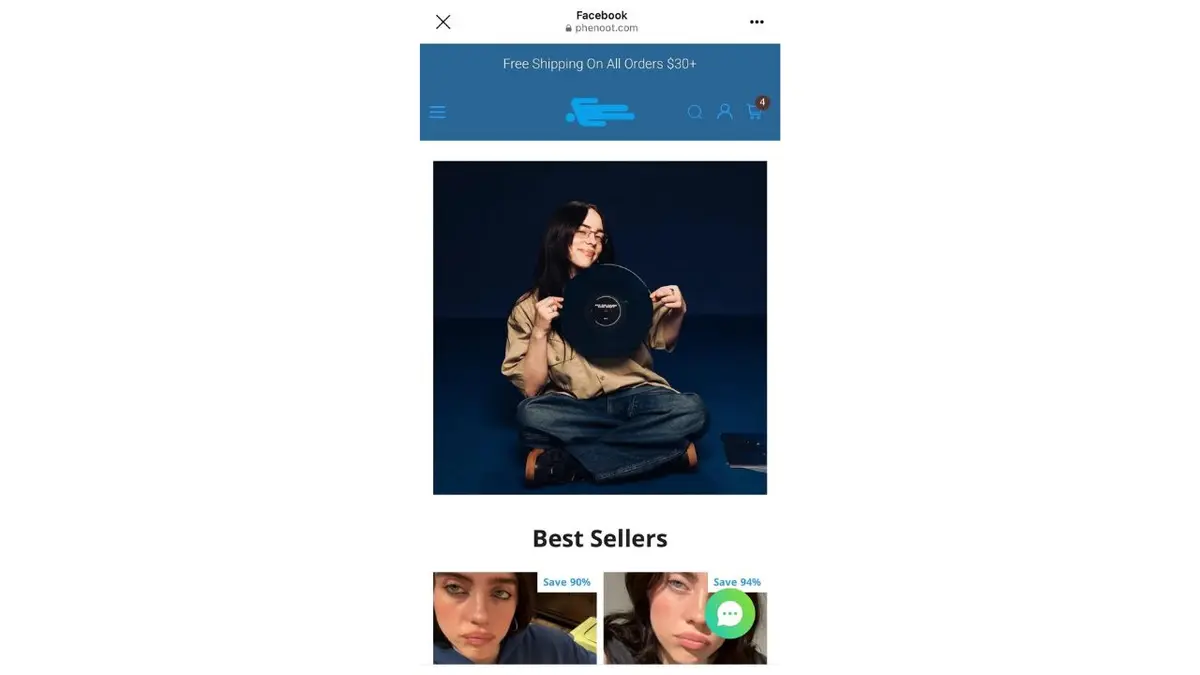Scam ads on Facebook have evolved beyond the days of misspelled headlines and sketchy product photos.
Today, many are powered by artificial intelligence, fueled by deepfake technology and distributed at scale through Facebook’s own ad system.
From fake crypto endorsements by celebrities to malware disguised as video game betas, the landscape of digital scams is smarter, faster and more dangerous than ever.
Join the FREE "CyberGuy Report": Get my expert tech tips, critical security alerts and exclusive deals, plus instant access to my free "Ultimate Scam Survival Guide" when you sign up!

DON’T CLICK THAT LINK! HOW TO SPOT AND PREVENT PHISHING ATTACKS IN YOUR INBOX
How Facebook scam ads have evolved with AI and deepfakes
Scammers used to rely on low-effort clickbait, but that era is over. Now, sophisticated schemes are leveraging AI-generated content. Technology is being used to create convincing videos of celebrities endorsing fake products or services. These ads exploit the trust users place in public figures and the perceived legitimacy of Facebook’s advertising platform. These tools can mimic a person’s appearance and voice with alarming accuracy, making it challenging for users to discern real from fake. And these tools are no longer out of reach. Scammers use a mix of freely available AI generators and private networks to mass-produce scam campaigns that look more real than ever.
ONE CLICK COST A FATHER $4 MILLION IN BITCOIN TO VISHING SCAMMERS
Real examples of Facebook scam ads using celebrity deepfakes
On Reddit, users have posted screenshots of bizarre scam ads that made it through Facebook’s filters:
One features an AI-generated video of Kelly Clarkson promoting a suspicious cash giveaway. There are reportedly over 20 accounts using variations of the name "Kelly Clarkson Live." These ads ask users to comment "Christmas" to receive free money, then instruct them to contact a WhatsApp number to claim their prize, which is a common tactic used to harvest personal information or initiate payment scams.
AI CYBERSECURITY RISKS AND DEEPFAKE SCAMS ON THE RISE

Another uses Billie Eilish’s face to endorse a knockoff shopping site. The design mimics standard e-commerce ads, making it easy to fall for, especially for fans or younger users.

How AI tools and deepfake tech power Facebook scam ads
These scams are not the work of lone fraudsters. They are coordinated efforts that mirror real digital marketing operations.
- Deepfake software is used to create fake video footage of celebrities.
- AI voice clones make fake endorsements sound eerily convincing.
- Text generators churn out fake user reviews, comment threads and testimonials.
- Scam kits with ad templates and deployment instructions circulate in private Telegram groups and Discord servers.
These operations are designed to appear legitimate. Landing pages mimic reputable news sites. Comment sections feature AI-written praise. Every element is optimized to build trust and get the click.
Who Facebook scam ads target and why you could be next
Scammers do not just blast out ads at random. They use Facebook’s ad targeting system to handpick the most vulnerable audiences.
- Older users are often targeted with health scams or celebrity cash giveaways.
- Men aged 25-45 are frequently shown crypto or investment ads featuring tech figures.
- Fans of specific celebrities or shows may see fake endorsements tied to those interests.
- Users who click on giveaways or contests are more likely to be targeted again, since Facebook tracks interaction history.
These groups are targeted because they are either perceived as trusting, impulsive or unfamiliar with how digital scams operate.
HOW TO ESCAPE FACEBOOK’S CREEPY AD TRACKING
Why Facebook scam ads keep getting past Meta’s moderation
Despite Meta’s claims of robust ad review, scam ads still make it through frequently and quickly. Here is why:
- Most ads are approved by automated systems that cannot catch nuanced AI fakery.
- Scammers use geographic targeting to show ads in regions less likely to report fraud or where enforcement is weak.
- The ads often run for only a short time before disappearing, making them harder to catch.
Even with tools like facial recognition being tested to detect unauthorized celebrity use, these systems have not been widely implemented. Meanwhile, investigations by consumer advocacy groups and cybersecurity firms have found that a significant portion of crypto-related Facebook ads are fraudulent. With scammers paying for ad space, Meta has little financial incentive to aggressively remove them.
Common signs of Facebook scam ads: What to watch for
Scam ads can be surprisingly well-made, but common themes show up again and again. Watch for:
- Free game betas or giveaways, especially ones that require downloads.
- Celebrity endorsements promoting crypto, weight-loss pills or supplements.
- Mimicked news articles or fake media logos.
- Urgent claims or miracle results, which are classic scam tactics.
If an ad prompts you to download a file, especially a .zip or .rar, it is almost certainly a trap.

HOW TO SPOT THE RED FLAGS FOR THIS LATEST FACEBOOK MARKETPLACE SCAM
How to protect yourself from AI-powered Facebook scam ads
Here is how to stay safe and help others do the same:
1. Check the source: If it is an ad, approach it with extra skepticism. Look it up independently.
2. Do not download files from ads: Especially avoid compressed formats like .zip or .rar, which often contain malware.
3. Verify endorsements: If a celebrity is promoting something, check their official social media or public statements.
4. Report suspicious ads: Even if you are not sure, reporting helps Meta identify fraudulent activity.
5. Talk to friends and family: Especially older adults, who may be more trusting of what they see on Facebook.
WHAT IS ARTIFICIAL INTELLIGENCE (AI)?
6. Be wary of unsolicited messages or friend requests and install strong antivirus software: Scammers often use fake profiles to send scam ads or phishing links via Facebook Messenger or friend requests. Avoid clicking links from unknown contacts. Also, install strong antivirus software, which adds a layer of defense that can block malware from scam links. This protection can also alert you to phishing emails and ransomware scams, keeping your personal information and digital assets safe. Get my picks for the best 2025 antivirus protection winners for your Windows, Mac, Android and iOS devices.
7. Consider using a password manager: If your credentials are compromised, this minimizes the risk of attackers accessing other accounts. A password manager can securely store and generate complex passwords. It will help you create unique and difficult-to-crack passwords that a hacker could never guess. Second, it also keeps track of all your passwords in one place and fills passwords in for you when you're logging into an account, so that you never have to remember them yourself. The fewer passwords you remember, the less likely you are to reuse them for your accounts. Get more details about my best expert-reviewed password managers of 2025 here.
8. Turn on two-factor authentication (2FA): 2FA can prevent unauthorized logins even if your password is stolen.
9. Regularly update your software and apps: Keeping your operating system, browsers and Facebook app updated ensures you have the latest security patches that can block known vulnerabilities exploited by scammers.
Get a free scan to find out if your personal information is already out on the web.
Kurt’s key takeaways
Scam ads on Facebook are evolving fast, using AI-generated content, fake celebrity endorsements and deepfakes to trick users into clicking. What looks like a game beta or cash giveaway can actually lead to malware, phishing scams or fake crypto schemes. Facebook’s ad review system isn’t catching these in time, which means users need to stay alert. Be skeptical of ads, avoid downloading files, install trusted antivirus software and talk to family members who may be more vulnerable.
Given how widespread and sophisticated scam ads have become on Facebook, do you think Meta should be held more accountable for protecting users, and if so, what actions should they take to better prevent these scams? Let us know by writing us at Cyberguy.com/Contact.
For more of my tech tips and security alerts, subscribe to my free CyberGuy Report Newsletter by heading to Cyberguy.com/Newsletter.
Ask Kurt a question or let us know what stories you'd like us to cover.
Follow Kurt on his social channels:
- YouTube
Answers to the most-asked CyberGuy questions:
- What is the best way to protect your Mac, Windows, iPhone and Android devices from getting hacked?
- What is the best way to stay private, secure and anonymous while browsing the web?
- How can I get rid of robocalls with apps and data removal services?
- How do I remove my private data from the internet?
New from Kurt:
- Try CyberGuy's new games (crosswords, word searches, trivia and more!)
- CyberGuy's exclusive coupons and deals
Copyright 2025 CyberGuy.com. All rights reserved.


